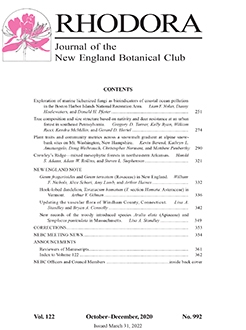This preliminary exploration of marine lichenized fungi (lichens) as bioindicators of water pollution examined the distribution of intertidal lichen communities in the Boston Harbor Islands National Recreation Area with respect to recorded pollution throughout the harbor. We found significant negative associations between pollution measurements and the health of the lichen community based on cover and species richness. We also observed significant differences in species composition between areas of higher pollution and areas of lower pollution, though not enough data are available to establish the pollution sensitivity or tolerance of individual species. We note that difficulties in the collection and identification of marine lichens hamper efforts to use them broadly as bioindicators. This study suggests that marine lichens could prove useful as bioindicators, but more research is needed to understand the differential effects of pollution on individual species as well as to establish practical procedures both for quantifying marine lichen community health and for widespread bioindication using marine lichens. Finally, one species collected during this study, Verrucaria ceuthocarpa, represents a first report for the Boston Harbor Islands National Recreation Area.
How to translate text using browser tools
12 April 2022
Exploration of Marine Lichenized Fungi as Bioindicators of Coastal Ocean Pollution in the Boston Harbor Islands National Recreation Area
Liam F. Nokes,
Danny Haelewaters,
Donald H. Pfister
ACCESS THE FULL ARTICLE

Rhodora
Vol. 122 • No. 992
October–December 2020
Vol. 122 • No. 992
October–December 2020
environmental impact
intertidal zone
lichen diversity
marine ecology
ocean health
water pollution





